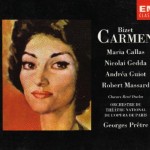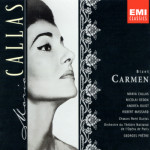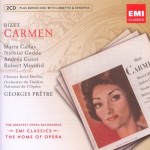Finally! It’s taken me a long time to finish this review – it took me about three full listens to “get into it.” I think the problem was that I’d read the negative review of this recording in the book Opera on Record too recently and it unfairly colored my first impression. One of these days I’ll have to write a piece about that book and others like it!
Carmen
1964, EMI
(Maria Callas, Nicolai Gedda, Robert Massard, Andrea Guiot; Choeurs René Duclos; Orchestre de Théâtre National de l’Opéra de Paris, cond. Georges Prêtre)
If this recording featured any Carmen other than La Divina, Maria Callas, I would consider it just a good, solid performance, less than remarkable but effective all the same, and refreshingly French for an international-scene Carmen of the ‘60s. Georges Prêtre leads the Paris Opera Orchestra in a moderately paced reading of the score that’s neither heavy-handed “grand opera” nor a lithe “opéra-comique” approach, but strikes a good balance between elegant finesse and pulsating drama. For better or worse, as was typical for the day, he employs the Guiraud recitatives instead of the original spoken dialogue.
The towering, smoldering presence of Maria Callas is what propels this Carmen from merely “good” to “an essential classic.” True, her Carmen isn’t one for all tastes. The 41-year-old Callas timbre is hardly a sweetly seductive sound and some of her vowels are odd. (This shows my ignorance of vocal technique, but why do her ‘Tra la la’s tend to sound like ‘Tru lu lu’?) But still, the smoky chiaroscuro of her tone combines with her legendary vocal acting to create a powerhouse portrayal of the iconic heroine: half elegant and half carnal, half hateful and half admirable, but always ready to fight to the death for her freedom. At her side is the surprisingly excellent Don José of Nicolai Gedda. A light lyric tenor may seem like odd casting for the role, but his sweet, golden timbre is both lovely and fitting for a young naïf to whom Carmen’s whole world is foreign, and he offers an urgent, passionate characterization, infusing every word with meaning. The whole recording is very much centered around its two leads: the all-French supporting cast contains no real standouts, but makes a good ensemble. Andrea Guiot’s Micaela lacks the sweet tone of a Freni or Cotrubas, but still, her warm, caressing sound makes her an effective foil to Callas’s Carmen, and while Robert Massard’s fairly nasal Escamillo isn’t the most seductive on recording, he at least sings with lithe, authentically French elegance rarely heard in the role. The Zuniga of Jacques Mars, the Frasquita and Mercedes of Nadine Sautereau and Jane Berbié, and all the other supporting roles are well sung and dramatically convincing throughout.
For diehard Callas fans, this is probably the Carmen to end all Carmens. For everyone else, it may or may not be your favorite. But either way, it’s an unforgettable performance that every true Carmen lover needs to hear.







Diderot
February 25th, 2014 at 20:51
Again, an even-handed review. It is not easy to love all of Callas’ recordings but she had such emotional power and intensity, and often a displayed a beautiful voice as well. I think her reputation is well-deserved.
I admit, my favorite “Carmen” is Solti’s with Tatiana Troyanos and Domingo. I have loved that recording since it came out in the 1970’s and I bought it on LP. There is a huge crowd who contemn Solti and Bernstein. I don’t get it. But those same folks usually can’t say anything bad about Bohm, Karajan and Furtwangler, so go figure.
Stefano
February 18th, 2018 at 11:13
Very fair review. Callas was at the final part of her stage career, just one year after this recording she will leave the stage forever, to return only in the early 70’s for a sad, ill-advised come back in a world concert tour with di Stefano.
Her voice was in bad shape, but the decline had started in the late 50’s and of course didn’t get better with years, even if she was still a young woman. Her high notes wobbly and strident, the volume very diminished, and there was a “gap” between her low chest notes (always powerful, if not a bot “pushed at times) and her upper register. Her middle voice had weakened, and in order to compensate that hole, she started to modify the shape of the vowels in order to produce “more sounds”, and basically in her middle register all the vowels sounded like a generic “UH”. Listen how she sings on her chest voice a clear “AH” sound in the first note “TRA” of her “TRA LA LA LA” in response to Zuniga, and eventually when she shift into the middle register she immediately transforms the LA into LU in all the other notes immediately afterwards. A technical trick, which sounds very bizarre to our ears. Notwithstanding all these flaws yes, I agree, her Carmen is “an essential classic” and stands out for her usual unique way to go deep into the character and really being able to create an unforgettable portray. What perhaps her Carmen is missing is the innate sensuality of the gipsy that her timbre dose not suggest. My 2 cents.